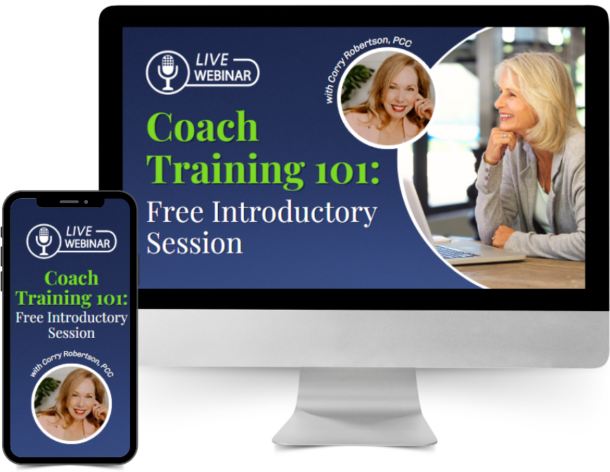It’s no secret that life can be challenging and confusing some of the time. From career choices to personal relationships, the path forward isn’t always clear-cut. We all hit those crossroads where we’re torn between options or uncertain about our next steps.
For some, these challenges along the way aren’t just bumps in the road – they can take a toll on our mental health. If confusion about life’s difficulties are starting to weigh heavy on your mind, there’s nothing wrong with wanting to seek help or asking to be referred to a licensed therapist.
But, on the other side of the spectrum, there are people who do need clarity in some of life’s twists and turns without the need for therapy. That’s when having a space space to talk things through with or a thinking partner in the form of a trusted coach can be a game-changer.
These thought companions can offer fresh perspectives, ask questions you might not have thought of, and provide much-needed support to make choices that align with your values and aspirations. Professional certified coaches can make navigating life’s labyrinth easier.

Coach vs. Therapist: Which Is Which?
Coaches and therapists are two different tools in a mental and emotional toolbox, each with a unique purpose and approach.
Therapists are like skilled detectives for your past and present. When life’s challenges seem rooted in unresolved traumas, deep-seated issues, or mental health conditions like anxiety or depression, a therapist will help you resolve them. They use therapeutic techniques to explore your emotions and behavioural patterns and help you make sense of your past experiences.
Therapists are trained to provide clinical support, making them ideal for addressing and healing psychological wounds and managing mental health conditions. Think of therapists as expert archaeologists, diving into the layers of your life to unearth hidden treasures of understanding and healing.
The guiding principle of the coaching profession is that people are complete, resourceful and whole, so coaches help you navigate life’s challenges to achieve personal and professional growth. Unlike licensed therapists, coaches don’t dive into your past; they’re more concerned with the here and now and where you want to go. I always describe coaching as positive, future focused and results oriented.
Whether you’re facing career dilemmas, seeking to enhance your relationships, or simply looking to unlock your full potential, coaches are your partners in progress. They’re responsible for asking powerful questions, helping you prioritize and focus on what matters, so you can become more efficient and productive not to mention happier!
Within this process, coaches can work with you on the self-discovery that illuminates and clarifies your attributes, skills, and considerations to improve performance and well-being.
Ultimately, a coach helps a client get on track and stay on track to achieve goals and performance standards while also assisting clients in resolving any obstacles and barriers that may arise along the way.
So, the key difference is this: therapists focus on understanding and healing the past and managing mental health conditions, while coaches concentrate on empowering you to shape a fulfilling future and achieve your aspirations. Depending on a person’s needs and goals, both can be invaluable allies on one’s path to personal growth and well-being.

About the Role of Coaches
Coaching is like having a trusted ally by your side in the journey of life. It’s a supportive and collaborative relationship that helps us achieve our personal and professional goals towards happiness and wellbeing. But here’s the twist: coaches don’t give you all the answers; they help you discover them yourself. The coach’s role it to be a thinking partner who will listen so deeply that their questions will be powerful enough to evoke new strategies to help you unlock your potential.
First and foremost, coaches create a safe space for exploring thoughts, emotions, and behavioural patterns. They focus on asking questions that make people pause and reflect. This self-reflection process is like shining a light into the corners of our minds we might not have explored before. It’s about helping someone become more self-aware by allowing them to gain insights into why they do what they do and how their emotions influence their decisions.
This newfound clarity empowers a person to make conscious choices that align with their values and goals in life. But more than holding space for provocative or inspirational converstaons, coaching is also all about taking action. Coaches work with you to set meaningful and realistic goals that get results.
Whether it’s about managing stress, improving relationships, boosting self-esteem, or achieving wellbeing, they help you identify your targets and create a roadmap to reach them. It’s all about helping you break down those intimidating goals into manageable steps to make steady progress.
Studies have shown that coaching can significantly improve areas like goal attainment and emotional intelligence. Another research study even found executive coaching to be an effective measure for increasing workplace well-being and reducing stress and depression. Simply put, coaching is not magic; it’s a systematic approach grounded in psychology and human behaviour.

How To Decide If Coaching Is Right For You
Your coach knows it’s important to handle each client with a mix of empathy and empowerment. They often start by acknowledging your courage in taking this step — a sign of your dedication and inner strength. And as they listen intently, they create a safe space where you can open up about your challenges and goals.
A coach’s role is to evoke awareness through compassionate inquiry so that you gain new perspective and insights. They will inspire you to embrace self-compassion, emphasizing that it’s okay not to have all the answers. More specifically, if you are considering the following issues in your life, here’s how a professional certified coach can help you:
I Don’t Need Therapy…But I Need Practical Strategies To Reach My Professional Goals
If you find yourself saying this, it’s essential to acknowledge your self-awareness and determination. A professional coach understands that it’s your vision for your professional future that matters most. They’re here to listen, not to tell. They’ll listen closely to your career aspirations and the challenges you face without judgment.
From there, your coach will work with you to empower you to develop actionable solutions. The goal is to sharpen your skills, overcome obstacles, and envision a successful professional path with purpose and direction. This approach fosters your growth, instills confidence, and propels you toward your career objectives while helping you find the answers within yourself.

I Don’t Need Therapy…But I’ve Been Feeling Overwhelmed by Stress
If you’ve been feeling overwhelmed by stress, know that it’s okay to seek support. A professional coach is here to offer compassion and support as you regain balance. They appreciate your honesty and are committed to being there for you.
Your coach will start by helping you identify how istress impacts your life impacts your life and what you want instead. With your insights, you’ll collaboratively develop practical coping mechanisms tailored to your unique needs. This might involve exploring mindfulness and relaxation methods or practicing self-care techniques.
Your work in coaching will remind you that seeking support is a courageous step towards well-being and your coach is committed to accompany you as you achieve that goal. Their approach creates trust because you know they’re dedicated to your overall success and helping you lead a more balanced and fulfilling life.
I Don’t Need Therapy…But I Need Help Improving My Relationships
When you seek help to improve your relationships, your coach understands that relationships are the building blocks of support, connection, and growth. They approach this with understanding and a sense of collaboration.
If your intention is to focus on communication, empathy, and conflict resolution, your coach will partner with you to identify communication patterns, practice active listening, and work on expressing your needs effectively.
Together, you may expore empathy, allowing you to consider and understand others’ perspectives better, and develop conflict resolution skills that address issues constructively. Coaching is a great way to gain the confidence to set boundaries, building healthier and more fulfilling personal or professional relationships while finding the answers within yourself.

I Don’t Need Therapy But…I Need Help Reigniting My Passion and Purpose
Your passion and purpose serve as your life’s compass, providing clarity, motivation, and direction. A professional coach understands that aligning your actions with your passions and purpose leads to greater fulfillment and resilience in the face of challenges.
If you’re feeling burnt out or disconnected from your true calling, a coach acknowledges your unique journey and your desire to reignite that passion. They’ll be your guiding hand in helping you remember why you started this journey in the first place.
Starting with exploration of your values and interests, your coach will uncover what truly resonates with you. Together, you’ll break down your objectives into manageable steps, developing a roadmap that nurtures your passions and may incorporate mindfulness techniques aligned with your purpose.
Regular reflection and adjustment will be part of the process to ensure you stay on track and find the answers within yourself. This journey is about reconnecting with your passion and purpose, and your coach is here to support you every step of the way.

Coaches Are Your Thinking Partners
In the pursuit of personal and professional growth, having a coach as a partner can be a transformative asset. They support you to uncover strengths, identify blind spots, and navigate challenges with resilience. But equally important is the recognition that a one-size-fits-all coaching approach won’t yield optimal results.
Each of our unique journeys deserves a tailor-made coaching process that aligns with our specific needs and aspirations. Just as each individual is distinct, so is our coaching experience. Whether it’s about finding an executive coach, seeking to boost your career, enhancing your relationships, rediscovering your passion, or tackling personal obstacles, a personalized coaching approach ensures you receive the most relevant guidance.
Understanding the importance of customization in coaching empowers us to make the most of the experience and ensures that our goals are achieved efficiently and effectively. It’s about recognizing that our individual path to success is uniquely ours, and the right coach will help us navigate it, step by step, in a way that resonates with our values, ambitions, and dreams.
It’s also important to note that ICF Certified Coaches have been trained how to recognize topics that are out of scope for coaching and require a referal to therapy.
So, when seeking a coaching partnership, make sure you search for an ICF Certified Coach, and remember that it’s not just about finding a coach but also finding the right coaching approach for your needs—a key to unlocking your fullest potential and embracing a future filled with achievement and fulfillment.
Looking for just the right coach for you? Explore our Bench of ICF Certified and
Credentialled Coaches. Our Bench consists of coaches trained by The Coaching Academy for Leaders so you can be assured of excellence in your coaching experience.





0 Comments